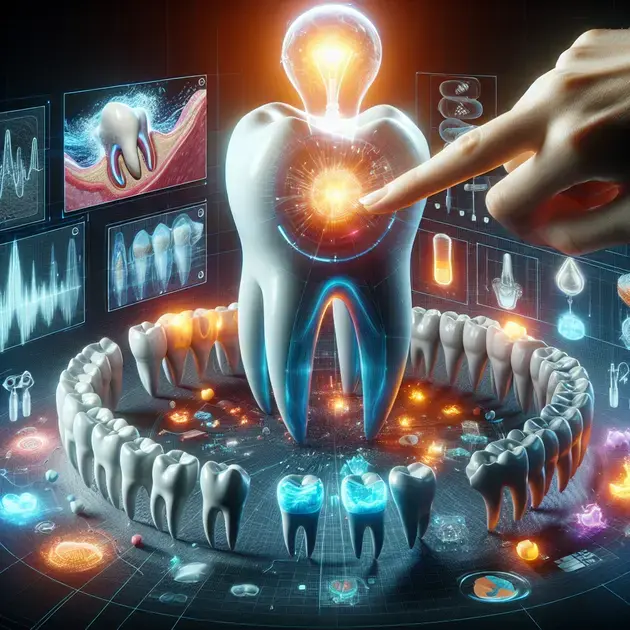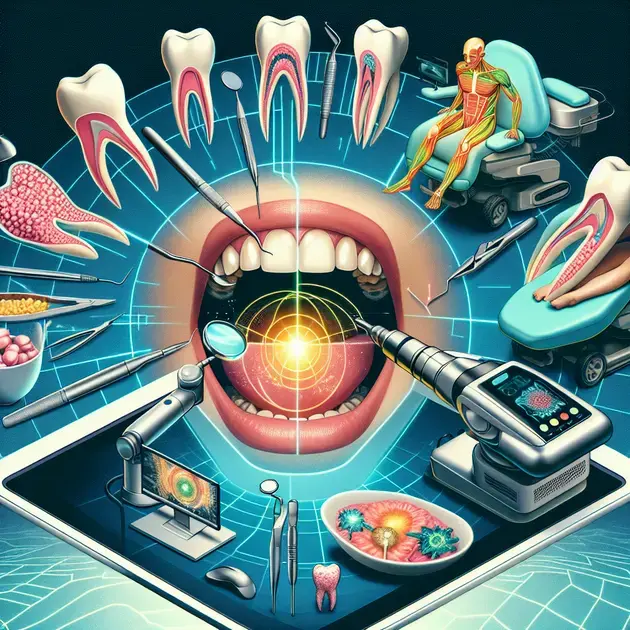When it comes to maintaining good oral health, knowing the most effective tooth decay treatment options is essential. In this comprehensive guide, we will explore the latest advancements and techniques for treating tooth decay.
From traditional methods like fillings and crowns to innovative approaches such as fluoride treatments and dental sealants, the field of tooth decay treatment has evolved significantly in recent years. Stay informed and make empowered decisions about your oral health with this in-depth guide.

Effective Tooth Decay Treatment Options Explained
When it comes to treating tooth decay, it’s essential to explore the various options available to ensure optimal oral health. One effective treatment option is dental fillings, which involve removing the decayed part of the tooth and filling the space with a material such as amalgam or composite resin. This procedure helps restore the tooth’s function and prevent further decay.
Another common treatment for tooth decay is a dental crown. This involves placing a custom-made cap over the decayed tooth to restore its shape, size, and strength. Dental crowns are durable and long-lasting, making them an excellent option for treating advanced decay.
In some cases of severe decay, a root canal may be necessary. During a root canal procedure, the infected pulp inside the tooth is removed, and the inside of the tooth is cleaned and sealed. This treatment can help save a severely decayed tooth from extraction.
For individuals with minor tooth decay, remineralization treatments may be recommended. These treatments involve the use of fluoride or other remineralizing agents to strengthen the tooth enamel and reverse the early stages of decay.
Overall, the most effective tooth decay treatment option will depend on the extent of the decay and the individual’s oral health needs. Consulting with a dentist is crucial to determine the best course of treatment for each specific case.
Latest Advancements in Tooth Decay Treatment
Recent advancements in dental technology have led to innovative approaches to treating tooth decay. One significant advancement is the use of dental lasers for decay removal. Laser technology allows for more precise and efficient removal of decayed tissue, reducing the need for drills and minimizing discomfort for the patient.
Nanotechnology is another promising advancement in tooth decay treatment. Nanomaterials can be used to remineralize enamel and protect teeth from further decay. These advanced materials provide a minimally invasive approach to treating decay and promoting oral health.
Furthermore, researchers are exploring the use of probiotics to prevent and treat tooth decay. Probiotic supplements containing beneficial bacteria can help restore the natural balance of oral microbiota, reducing the risk of decay-causing bacteria colonizing the teeth.
3D printing technology is also revolutionizing tooth decay treatment by allowing for the creation of custom-made dental restorations with precision and efficiency. This technology enables dentists to provide patients with seamless and durable solutions for decayed teeth.
By staying informed about the latest advancements in tooth decay treatment, individuals can make educated decisions about their oral health and explore innovative options for preserving their teeth and smile.
Empower Yourself with In-Depth Tooth Decay Treatment Guide
For those seeking comprehensive information on tooth decay treatment, various online resources can provide detailed guides and instructions. Websites such as WebMD and the American Dental Association offer comprehensive guides on tooth decay treatment options, prevention strategies, and post-treatment care.
Additionally, dental apps like Brush DJ and MyTeeth can empower individuals to maintain good oral hygiene practices to prevent tooth decay. These apps provide reminders for brushing, flossing, and dental appointments, as well as educational content on oral health.
Attending seminars or webinars conducted by dental professionals can also be a valuable source of in-depth information on tooth decay treatment. These sessions cover various treatment modalities, preventive measures, and lifestyle habits that can impact oral health.
Furthermore, consulting with a trusted dentist and discussing personalized treatment plans is essential for individuals looking to address specific concerns related to tooth decay. Dentists can offer tailored guidance and recommendations based on the individual’s oral health status and treatment goals.
By leveraging these resources and engaging in proactive oral health practices, individuals can empower themselves with the knowledge and tools needed to effectively manage and treat tooth decay, ensuring a healthy and vibrant smile for years to come.

Advanced Techniques for Managing Tooth Decay
When it comes to managing tooth decay, advanced techniques offer innovative solutions that can effectively address the issue. One technique that has shown promising results is silver diamine fluoride (SDF) application. SDF is a liquid substance that can halt the progression of tooth decay and even reverse cavities in some cases. By applying SDF to the affected areas, dentists can help strengthen the enamel and prevent further decay.
Another advanced technique for managing tooth decay is ozone therapy. Ozone is a natural gas that has powerful antimicrobial properties, making it effective in killing bacteria that cause decay. Through ozone therapy, dentists can target and eliminate harmful bacteria in the mouth, promoting a healthier oral environment and slowing down the progression of decay.
Micro-invasive treatments such as resin Infiltration are also considered advanced techniques for managing tooth decay. This procedure involves the use of a resin material to fill and seal the pores in the enamel, preventing bacteria from causing further damage. By addressing tooth decay in its early stages with micro-invasive treatments, patients can avoid more invasive procedures such as fillings or crowns.
Overall, advanced techniques for managing tooth decay offer patients effective and minimally invasive options for addressing dental issues. By exploring these innovative approaches, individuals can maintain their oral health and prevent the need for extensive treatment in the future.
Holistic Approaches to Treating Tooth Decay
When it comes to treating tooth decay holistically, a focus on overall health and wellness is essential. One holistic approach to treating tooth decay is through diet and nutrition. Consuming a balanced diet rich in essential nutrients can help support the body’s natural healing process and strengthen teeth. Foods high in calcium, vitamin D, and phosphorus can promote enamel health and reduce the risk of decay.
Another holistic approach to treating tooth decay is through the use of herbal remedies and natural products. Essential oils such as tea tree oil and clove oil have antimicrobial properties that can help fight bacteria in the mouth and promote oral health. Additionally, herbal supplements like licorice root and cranberry extract have been shown to have beneficial effects on oral health.
Practicing mindfulness and stress-reducing techniques can also be beneficial in treating tooth decay holistically. Chronic stress can weaken the immune system and increase the risk of oral health issues, including decay. By incorporating relaxation techniques such as meditation, yoga, or deep breathing exercises into daily routines, individuals can support their overall health and reduce the impact of stress on their oral health.
Overall, holistic approaches to treating tooth decay encompass a range of natural and alternative methods that prioritize the body’s intrinsic ability to heal. By adopting a holistic approach to oral health care, individuals can address tooth decay in a comprehensive and sustainable way.
Navigating the Maze of Tooth Decay Treatment Options
With numerous treatment options available for tooth decay, navigating the maze of choices can be overwhelming. One common treatment option for tooth decay is dental fillings. Fillings are used to restore the structure of a tooth that has been damaged by decay, preventing further deterioration and restoring function. They can be made from materials such as amalgam, composite resin, or gold, each with its own advantages and considerations.
Another popular treatment option for tooth decay is dental crowns. Crowns are used to cover and protect a tooth that has extensive decay or damage, providing strength and support to the tooth structure. Crowns can be made from materials such as porcelain, metal, or a combination of both, depending on the individual’s needs and preferences.
For more advanced cases of tooth decay, root canal therapy may be necessary. This treatment involves removing the infected pulp from the tooth, disinfecting the root canal, and sealing it to prevent further infection. While root canal therapy is often associated with a negative reputation, modern advancements have made the procedure more comfortable and effective than ever before.
When considering treatment options for tooth decay, it is essential to consult with a dental professional to determine the most appropriate course of action based on the severity of the decay, individual oral health needs, and personal preferences. By understanding the various treatment options available, individuals can make informed decisions about their oral health care and navigate the maze of tooth decay treatment with confidence.
Conclusion
In conclusion, exploring advanced techniques for managing tooth decay can provide patients with effective and minimally invasive options to address dental issues. Silver diamine fluoride (SDF) application, ozone therapy, and micro-invasive treatments like resin infiltration offer innovative solutions that can halt the progression of decay, strengthen enamel, and prevent further damage. By embracing these advanced approaches, individuals can proactively maintain their oral health and potentially avoid more invasive procedures in the future.
Furthermore, holistic approaches to treating tooth decay emphasize the importance of overall health and wellness. Through a focus on diet and nutrition, herbal remedies, and stress-reducing techniques like mindfulness, individuals can support the body’s natural healing process and promote oral health from within. By adopting a holistic approach to oral care, individuals can address tooth decay comprehensively and sustainably, leveraging the body’s intrinsic ability to heal.
Lastly, when faced with the maze of tooth decay treatment options, it’s crucial to consult with a dental professional to determine the most suitable course of action based on individual needs. Dental fillings, crowns, and root canal therapy are common treatments that restore damaged teeth, provide structural support, and eliminate infection respectively. By understanding the available options and working closely with a dentist, individuals can make informed decisions about their oral health care, navigating the complexities of tooth decay treatment with confidence and clarity.